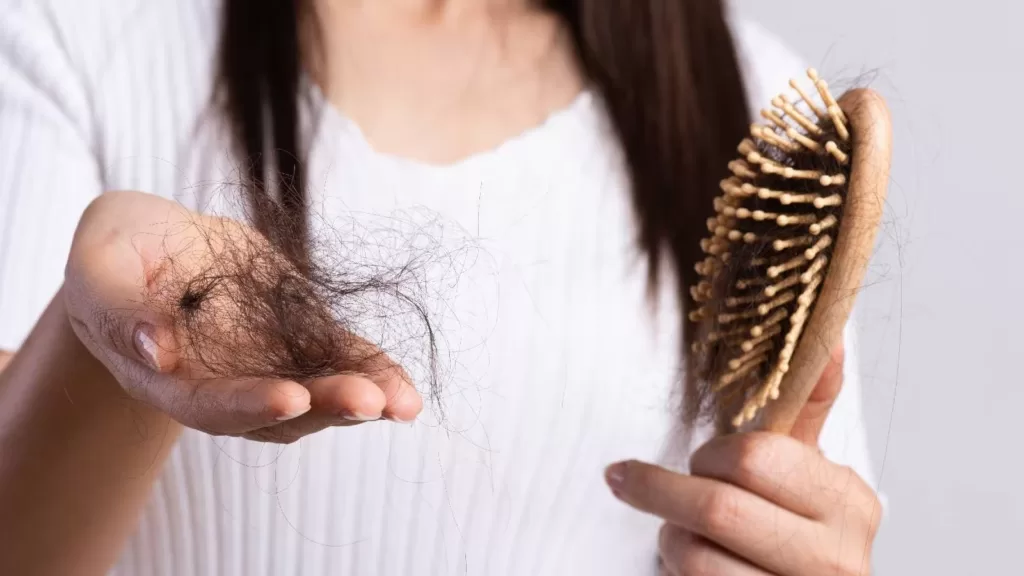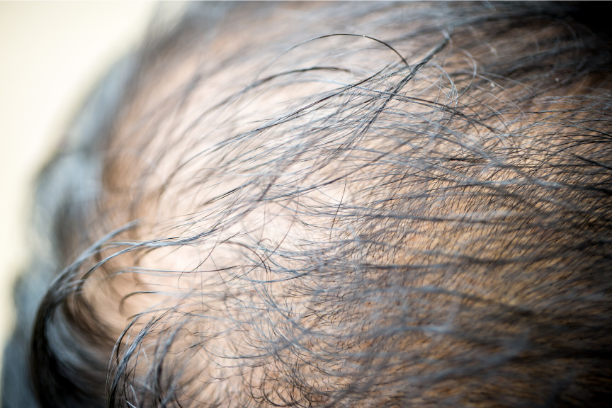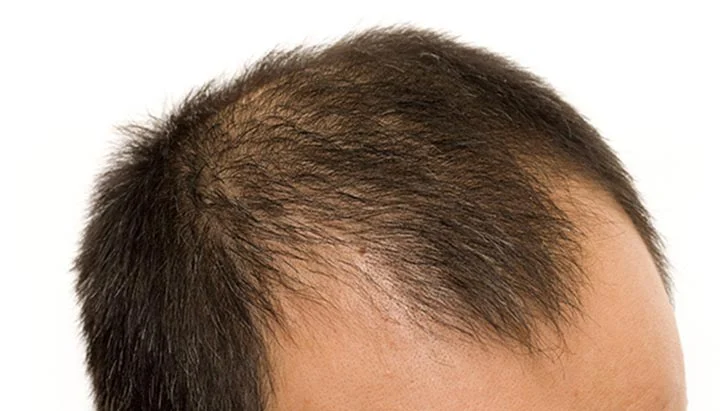Premature hair loss is a condition in which a person loses hair before they should based on their age, genetics, and other factors. Baldness is a more advanced form of hair loss in which an individual loses most or all of their hair on the scalp.
Hair loss can be caused by many things, like genes, hormonal imbalances, medical conditions, side effects of medications, and lifestyle choices like stress, a bad diet, and smoking. Androgenetic alopecia, also known as male or female pattern baldness, is the most common form of hair loss and occurs due to a genetic predisposition to sensitivity to hormones called androgens, which cause the hair follicles to shrink and eventually stop producing hair.
Alopecia areata is an autoimmune disorder in which the body attacks hair follicles. Telogen effluvium is a temporary form of hair loss that can be caused by stress, medications, or changes in hormones. Depending on what’s causing the hair loss, you may be able to take medicine, get a hair transplant, or make changes to your lifestyle.

The reasons for hair loss, whether it be complete baldness or just a noticeable thinning of hair, are varied. In some cases, hair loss is a sign of a more serious health problem that will go away once it is treated. It’s important to see a dermatologist if you’re losing hair or going bald so that you can find out what’s causing the problem and start taking steps to fix it and grow new hair.
Let’s Review the most frequent factors in hair thinning before you go in for that consultation.
Hormonal Disruptions
Excess male hormones, or male androgens, and hormonal changes are the most frequent source of hair l such as alopecia. Androgens are involved in both female and male baldness. and thinning of hair.
Androgens can weaken hair follicles and increase hair loss in women with female-pattern baldness. Hormonal changes caused by estrogen, such as using birth control or starting menopause, could make androgen sensitivities worse.
Yet, an increase in dihydrotestosterone, an androgen, is linked to male-pattern baldness (DHT). DHT may shorten the lifespan of hair because it attaches to hair follicles and prevents further hair growth. Androgenetic alopecia is another term for this condition.
There are other medical conditions as potential causes of this type of hair loss. Prostate cancer, hypertension, cardiac illness, and polycystic ovarian syndrome are only a few of these.
Some Specific medications
A renowned Hair Loss Association reports that numerous drugs used to treat everyday health issues cause hair loss as a side effect. Drug-induced hair loss describes this condition.
Several drugs, like antidepressants, anti-inflammatory drugs, beta-blockers, and oral contraceptives, can cause hair loss or thinning as a side effect. Hair loss can also be brought on by taking inordinate amounts of vitamin A or retinoids, which are medications derived from vitamin A. Among the side effects of several chemotherapy medicines is complete hair loss.
If you’ve been losing your hair due to a medicine, it should start growing back once you stop using it, much like it does after chemotherapy. Don’t just stop taking your medications without consulting your doctor; he or she may want to try something else to see if the hair loss stops.
Thyroid Issues
Several hormone-related diseases may also play a role in hair thinning. Thyroid hormones may play a role in some.
A hormonal imbalance, which can be caused by either a thyroid that doesn’t work enough (hypothyroidism) or a thyroid that works too much (sources), can lead to hair loss. It has also been observed that autoimmune thyroid diseases like Hashimoto’s thyroiditis and Graves’ disease may be linked to hair loss.
Hormones secreted by the thyroid have a role in controlling just about everything, including hair growth. Treatment for either of these thyroid problems can restore hormonal balance, put an end to hair loss, and kick-start hair growth.
Alopecia Areata Subtypes
Alopecia areata is an autoimmune disorder that causes hair loss by damaging hair follicles and preventing new hair from growing in its place.
Some forms of AA cause hair loss only on the scalp, whereas others cause baldness everywhere. The Academy of Dermatology Association states that this autoimmune disorder can cause either temporary or permanent hair thinning, bald spots, balding, or complete baldness. Factors such as heredity are just one of many potential reasons. Consult your medical provider about available treatment options.
Being pregnant
Other hormonal imbalances, most notably the abrupt changes in hormone levels that take place after giving birth, can also cause hair loss. About 40–50% of new mothers experience some degree of hair loss. During pregnancy, your body’s estrogen surge might temporarily change your hair’s normal growth patterns. You may see less hair loss than usual during this time.
When your estrogen levels return to normal after pregnancy, you may experience more hair loss than usual. When your estrogen levels return to normal after pregnancy, you may experience more hair loss than usual. It’s also normal for new mothers to experience hair thinning or even bald spots after giving birth. Postpartum hair loss can begin anywhere from one month to six months after giving birth.
The severe shedding might continue for 6 to 15 months after giving birth, as “not all hair follicles in the resting stage during pregnancy will migrate into the shedding phase at once.” The thinning hairline and long hair in women are the most obvious signs of postpartum hair loss.
Hair follicles will start to grow back as soon as the rest of your body does. You won’t be bald forever; your hair will grow back. Even though hair loss after childbirth isn’t entirely avoidable, it can be lessened by avoiding stress and maintaining a healthy hair care routine.
Autoimmune Disorders
Hair loss can be caused by a variety of autoimmune illnesses, not just simply alopecia areata. Some practitioners state that additional autoimmune illnesses that can cause hair loss include Hashimoto’s thyroiditis and lupus. It’s possible that this kind of hair loss is permanent rather than temporary. But hair loss can be remedied with the aid of medicines and hair restoration procedures.
If a person already has one autoimmune disorder, it makes it more likely that they will get more in the future. As a result, it’s crucial that your doctor keep a close eye out for any signs of worsening health.

Stress
Hair loss can be precipitated by significant stress. which includes physical and mental stresses like getting sick or having surgery. Up to seventy percent of hair follicles enter a resting (telogen) state with acute telogen effluvium, whereas only about ten to twenty percent of hair follicles enter telogen ordinarily.
The AAD claims that stress, and not COVID-19, is the most common cause of hair loss in men and women. According to the group, hair loss is also common during the recovery process from a fever or other illnesses.
It has been reported that emotional trauma can trigger acute telogen effluvium. Significant emotional stress can disrupt the natural cycle of hair growth when you’re dealing with a life-altering event like a divorce or breakup, bankruptcy or other financial troubles, the loss of a house, or the death of a loved one. This form of hair loss is usually just temporary, and regular hair growth can be resumed once stress levels have been brought under control.
Stressful events typically cause hair loss three to six months later. You may visit a dermatologist to discuss hair-growth medications, including minoxidil (Rogaine) and platelet-rich plasma (PRP) injections to help encourage hair growth.
Extreme Hair Care
According to the American Academy of Dermatology, your hair might suffer severe damage and breakage when you try to achieve a fashionable hairstyle, which can lead to hair loss and thinning. Too much manipulation of the hair (by pulling on it during blow-drying or tying it in a tight ponytail, for example) or the scalp (by rubbing it too roughly) can cause hair loss. Chemical hair treatments like perms, relaxers, and dyes may also contribute to hair loss due to damage.
You should seek out shampoos and conditioners that are mild and appropriate for your hair” in order to prevent any unnecessary harm.
Trichophagia
While stress is a common short-term reason for hair loss, trichotillomania has been linked to prolonged or extreme stress or anxiety. The mental health problem is linked to OCD and other anxiety disorders, according to researchers.
Hair loss in prominent patches and a sense of comfort or pleasure after removing hairs are also symptoms of trichotillomania.
Yet, trichotillomania can also occur as a coping mechanism for those who have experienced hair loss due to other causes and who have a family history of compulsive hair-pulling disorders.
People who think they may have this mental health disorder can get help in the form of cognitive behavioral therapy and habit reversal training, both of which work well. These treatments can make people more aware of their urges to pull out their hair and help them find other ways to deal with stress. While there are currently no FDA-approved treatments specifically for trichotillomania, some antidepressants, and antipsychotics may be helpful.
Physical Injury
Hair loss, in the form of thinning hair or even clumps of hair falling out, can occur when the body’s natural cycle of hair growth and rest is disturbed, as can happen when you’re under extreme physical stress. A traumatic event like an accident, surgery, severe burns, or a life-threatening illness can result in hair loss.
Additional reports confirm that this can cause as much as 50–75% hair loss, sometimes months later. Sometimes, hair loss due to telogen effluvium can be reversed in as little as six to eight months.
Loss of hair can also be a symptom of an underlying health problem. Some medical conditions, like a high fever or a serious illness, can cause temporary hair loss. Physical stresses like bacterial illnesses like syphilis or fungal skin diseases can also result in hair loss.
Seeking medical help for the underlying health problem is the first step to regrowing hair and stopping further hair loss if the infection that is causing the problem is treated.
Deficits in essential nutrients
Because they help with the process of hair growth and cellular turnover, “deficiencies in specific vitamins and minerals might lead to hair loss and reduced hair growth, According to the AAD, a lack of protein, biotin, zinc, and iron can result in hair loss.
A healthy, varied, and well-balanced diet provides vital nutrients, like vitamins and protein, that maintain optimal organ and system function throughout the body. Nutrient deficiencies, such as those caused by poor nutrition or extremely restricted macronutrients, cause hair loss in many forms, from gradual thinning to sudden bald spots.

To avoid getting too much of a nutrient, you should talk to your doctor before taking any over-the-counter supplements to fix what you think is a deficiency. Your doctor can do lab tests to see if you are really missing any nutrients.
Eating fatty fish, berries, leafy greens, and other items that may encourage good hair development may be helpful, but she also acknowledges that even a healthy diet might have its limitations.
Although eating a good, balanced diet can help prevent hair loss, it can still occur due to inherited factors.
Too much of some nutrients, including vitamins A and E, can cause hair loss if taken in excess, so it’s crucial to talk to a doctor before taking any supplements.
Disclaimer: This information is for educational purposes only, and no medical advice should be inferred from it. Before changing your diet or adding supplements, please talk to your doctor.
The author’s views are his or her own. The facts and opinions in the article have been taken from various articles and commentaries available in the online media and Eastside Writers does not take any responsibility or obligation for them.
Note: Contact our Writers at www.eastsidewriters.com for writing Blogs/Articles on any niche. We have experts in various domains from Technology to Finance and from Spirituality to Lifestyle and Entertainment.






